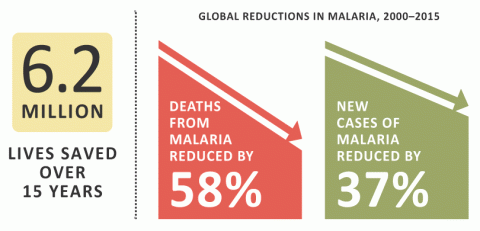Share
GOP Continued War on Abortion Causes Funding Cuts for HIV and Malaria Prevention

As expected, the White House reinstated the “Mexico City policy” which blocks federal funding for charities that provide abortion services. But Trump was not satisfied with just following in the footsteps of President Reagan, who first imposed this policy, or Presidents George H.W. Bush and Georgia W. Bush, who also enforced it during their time in office. Instead he made it even worse:
Previously, only federally funded family planning organizations were affected. Now the restrictions apply to any nongovernmental group receiving funds provided by the State Department, the U.S. Agency for International Development and the Department of Defense. So the plan would apply to the President's Emergency Plan for AIDS Relief, or PEPFAR, which funds HIV prevention and treatment in nearly 60 countries, and the President's Malaria Initiative.”
The amount of U.S. funds now covered are nearly $9 billion compared with $600 million in earlier iterations.
Trump took an unnecessarily broad swipe at NGOs without concern for the good work they do to combat preventable and treatable diseases. These are not just family planning charities, but groups that offer a wide range of health services.
The impact will be felt in communities where one stand-alone clinic addresses a wide span of health needs. The local reproductive health clinic could receive PEPFAR funding for a program to prevent HIV transmission or U.S. funding to provide bed nets to ward off malaria-carrying mosquitoes. If that clinic provides or promotes abortion, then all of those U.S. funds would now be cut.
There are strong reactions to the policy from anti-abortion groups and from supporters of abortion rights.
"This is going to result in an increase in the number of unintended pregnancies, in the number of unsafe abortions, in the number of mothers dying, whether from pregnancy-related causes or HIV causes, and also in the number of infant and child deaths," says Geeta Rao Gupta, executive director for the United Nations Foundation's 3D Program for Girls & Women, which addresses the needs and rights of women.
But never fear! The government may offer waivers to non-governmental organizations offering HIV services in regions without other options.
The State Department plans to track the impact of the policy over the first six months of its rollout. For a program like PEPFAR, the goal is to determine whether the new restrictions disrupt HIV prevention and treatment. The State Department is prepared to offer waivers to NGOs in regions with no other providers of HIV services. "It would have to be a data-driven discussion to really make that case," says a senior State Department official familiar with PEPFAR who requested anonymity.
So waivers will prevent any issues with HIV prevention and treatment, right? According to Scott Evertz, the former director of the While House Office of National AIDS Policy during the George W. Bush administration who is also pro-life, that assumption is wrong.
"I think that [the waiver is] an attempt to placate those who are very concerned about this policy," says Scott Evertz, former director of the White House Office of National AIDS Policy during the Bush administration. He expressed concerns about what metrics would be used to track whether a waiver was necessary and which staffers within the State Department would carry out this evaluation. "I know there are a lot of smart people in the federal government, but I don't think that's been thought through at all."
"I'm proudly pro-life," Evertz states. "I don't like the idea of abortion and terminating pregnancy to be the solution to an unwanted or unplanned pregnancy. However, all that said, I have no doubt that this policy will result in the unnecessary deaths [from HIV] of individuals that were living as a result of the assistance that we were providing."
Sources:
